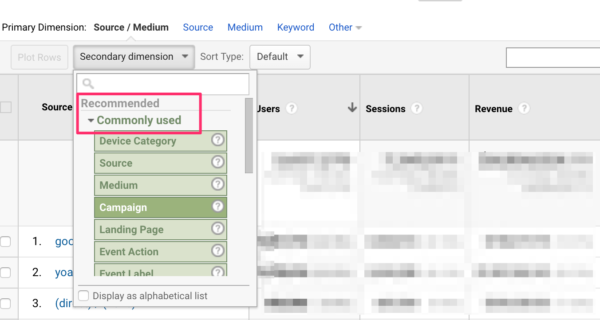Transform Your Analytics Strategy With Secondary Measurement in Google Analytics
By incorporating additional dimensions into information evaluation, a brand-new layer of understandings emerges, losing light on elaborate user actions and communications. The calculated application of secondary measurements holds the essential to opening a treasure trove of important information that can change just how companies translate and act upon their data.
Recognizing Additional Dimensions in Google Analytics
Additional measurements in Google Analytics provide extra context to primary data by permitting users to assess metrics across a second measurement, providing deeper understandings into individual actions and interactions on a web site. Secondary Dimension in Google Analytics. While primary dimensions give fundamental data factors such as pageviews, bounce price, and session duration, additional measurements provide an even more comprehensive view by segmenting the primary data even more. This segmentation enables users to evaluate metrics in mix with an additional dimension, such as traffic sources, demographics, or customer actions
Benefits of Using Second Dimensions
Making use of second dimensions in Google Analytics uses a strategic benefit by improving the depth of analysis and offering a more comprehensive understanding of individual interactions and behavior on a website. By incorporating secondary dimensions, experts can acquire beneficial insights right into the performance of specific sectors or variables within their data. This makes it possible for an extra detailed examination of customer actions past surface-level metrics, enabling a deeper expedition of the variables affecting individual interaction and conversions.

Exactly How to Execute Second Dimensions
When incorporating additional measurements in Google Analytics, one necessary action is to choose the pertinent metrics and measurements to enrich the analysis procedure. Clicking on this switch will certainly open a drop-down menu listing different dimensions that can be included to your primary dimension for deeper understandings.
After picking the appropriate additional measurement, such as 'Source/Medium' or 'Tool Classification,' Google Analytics will certainly present the data in a more detailed style, permitting you to cross-analyze different aspects of individual behavior. Keep in mind to try out different combinations of second and key measurements to uncover beneficial patterns and fads that can notify your advertising techniques. By applying additional dimensions thoughtfully, you can get a more thorough understanding of your web site or application efficiency and make data-driven decisions to maximize your digital presence.
Studying Data With Additional Measurements
Enhance your information evaluation in Google Analytics by integrating second dimensions to dig deeper right into customer habits more info here patterns and enhance your digital advertising strategies successfully - Secondary Dimension in Google Analytics. By including additional measurements to your key information, you can obtain useful understandings that can help you make informed decisions about your web site or app performance
Examining data with secondary measurements allows you to sector your primary data additionally, supplying an extra detailed view of customer interactions. Incorporating the main measurement of 'source/medium' with a secondary measurement like 'touchdown page' can disclose which specific web find this pages are driving web traffic from different resources. This info can be important in fine-tuning your content method or maximizing your marketing campaigns to enhance conversions.
Additionally, using additional measurements allows you to recognize connections in between various metrics, aiding you recognize the effect of different variables on individual habits. Whether it's examining demographics along with individual involvement metrics or device classifications with conversion prices, second measurements encourage you to reveal hidden trends and patterns that can direct your marketing efforts.
Enhancing Efficiency With Second Measurements
To boost the effectiveness of data analysis and decision-making in Google Analytics, incorporating additional dimensions is crucial to maximizing efficiency metrics and obtaining much deeper understandings into user habits patterns. By using additional measurements, experts can delve beyond surface-level data and discover valuable relationships that may otherwise go unnoticed. This optimization method allows businesses to tailor their advertising and marketing initiatives a lot more properly, identify areas for enhancement in site functionality, and improve general customer experience.
Second measurements supply a more comprehensive view of individual communications by supplying extra context to main data metrics. Matching the key measurement of 'landing web page' with a second dimension like 'tool classification' can disclose whether specific devices are extra most likely to drive involvement on certain landing pages. This insight can educate responsive layout enhancements or targeted advertising approaches to improve performance.

Verdict
In verdict, the assimilation of additional measurements in Google Analytics gives organizations with a powerful tool to boost their analytics technique. Secondary Dimension in Google Analytics. By delving deeper right into user actions and communications, marketing professionals can uncover beneficial insights that can drive efficiency optimization and enhance the total individual experience. Leveraging secondary measurements enables a much more comprehensive evaluation of data, leading to more enlightened decision-making and tailored advertising initiatives
Second dimensions in Google Analytics provide extra context to key data by permitting individuals to evaluate metrics throughout a second dimension, supplying deeper insights right into individual actions and interactions on a web site. While primary measurements offer basic information factors such as pageviews, bounce price, and session period, secondary measurements offer an even more detailed sight by segmenting the main information better.One of the key benefits of making use of second dimensions is the capacity to reveal connections and patterns that might not be right away obvious when assessing information with primary measurements alone.When including second measurements in Google Analytics, next page one vital action is to pick the relevant metrics and dimensions to enhance the evaluation procedure. Pairing the primary dimension of 'landing page' with an additional dimension like 'gadget classification' can expose whether particular tools are a lot more likely to drive involvement on certain landing pages.
Comments on “Mastering Secondary Dimension in Google Analytics: A Full Guide”